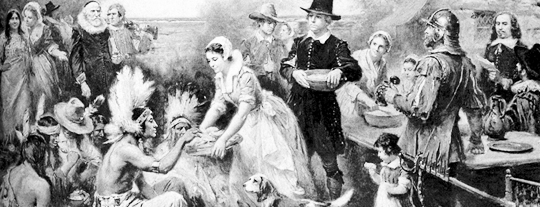Thanksgiving is only about two weeks away, and I know you all are as excited as I am to go home to family and good food. When we inevitably give thanks during this holiday, I’d like you to consider a few extra folks you should be thankful for and how to appropriately celebrate them.
For students, Thanksgiving serves as a deep breath before the plunge into finals. We need this time to recollect and re-center ourselves. We’re thankful that this deep breath also occurs on arguably the best food day in the United States. Thanksgiving is many people’s favorite holiday due to the roasted turkey, stuffing and sweet potato casserole at family gatherings.
Unlike Flag Day or Labor Day, people actually celebrate Thanksgiving with quite a bit of gusto.
Celebrations, like Thanksgiving, come with a history and a script. As children, we were all taught about the first Thanksgiving, when in 1621 a starving group of pilgrims were saved by the bountiful harvests and generosity of the Wampanoag people. In Kindergarten, my class and I recreated this story, wearing either assumedly Native American headgear or a Puritan cap and eating some dry turkey breast.
Despite insistence in grade school to understand this history, to call this previously described story the first Thanksgiving is a complete fabrication; one conjured up in the late 19th century and propagated following World War I.
The first celebrated “Thanksgiving” came 16 years after the one we learn about in 1621. In 1637, John Winthrop, the Colony Governor of Massachusetts, proclaimed a “thanksgiving” to celebrate the safe return of several hundred heavily armed volunteers from their slaughter of Native Americans from the neighboring Pequot tribe in present-day Connecticut. These armed volunteers massacred 700 Pequot Indians and they were celebrated for their actions.
Only in the 19th century did the story get spun to tell the happy story of cooperation among the indigenous and white settlers (as white settlers continued to displace the indigenous from their homes across the United States during that time).
This is a history that is repressed because it interferes with our conception of entitlement to the American continents. Native Americans are hardly ever seen in media and public discourse because their existence contradicts our own justifications for being in this country. White settlers and Americans did not come here peacefully or move about peacefully; they killed the people that were here first to do it.
I’m aware that it’s not typical or comfortable table conversation among many people and their families, and people may decide to ditch the origin story altogether. However, this is equally problematic as it denies a historical wrong ever occurred. As Americans, we must remember the triumphs as well as the failures. We cannot and must not erase the history that is unpalatable; otherwise we risk repeating it.
The second aspect of Thanksgiving celebrations is the script. I can only speak from my own experiences, but I expect certain aspects are common for many people.
After a Thanksgiving lunch at my Grandpa’s, family heads to my Aunt’s house for a smorgasbord, giving thanks to the great food and great people throughout. After eating, we chat about our lives, watch the various football games, pass a football around and perhaps play a board game before eventually returning home.
This script is common; it isn’t broken in any way, so there isn’t much need to fix it. However, I would like to offer ideas to augment such plans.
The first thing you could do is repudiate the incorrect history you have been told your entire life, that your comfort in the United States was ensured through the destruction of the indigenous communities already here. You can acknowledge and address this uncomfortable history by learning more about these communities and seeking to support our indigenous peoples through numerous ways. Give thanks to a family member by giving gifts that were bought directly from indigenous artisans or artists. Support community movements in the 500 plus tribes in the U.S. through monetary donations.
You could even support the Catholic schools on reservations that are always in need of resources to serve their communities.
I contend that ignorance on Thanksgiving is not bliss- not for everyone. The lie of Thanksgiving must be broken and a new script written. I’m asking for your help to make Thanksgiving as uplifting and reflective as it can possibly be. Thank you.












